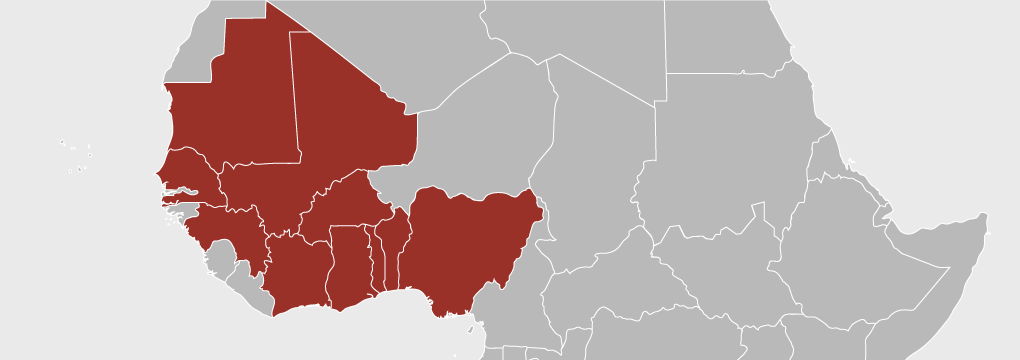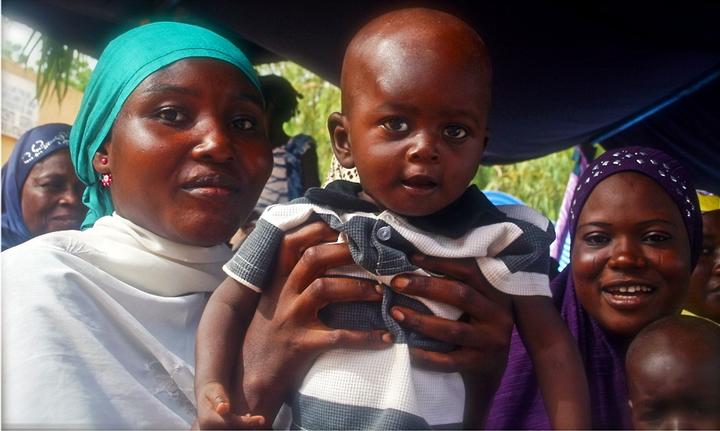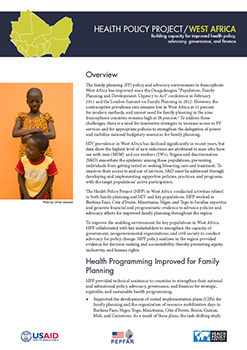The Health Policy Project ended in 2016. Work continued under Health Policy Plus (HP+) until 2022.
West Africa

Country & Regional Programs
- ► Africa
- ► Asia and the Middle East
- ► Europe and Eurasia (E&E)
- ► Latin America and the Caribbean (LAC)
Overview
With some of the fastest growing populations in the world, countries in West Africa continue to address the need for adequate access to high-quality family planning services, which can improve health and economic development. Women face increased health risks from unplanned pregnancies and unhealthy birth spacing, which contributes to high mortality rates for mothers and infants, and underscores the need to increase the supply of contraceptives and expand family planning services.
In 2011, the Ouagadougou Partnership was launched at a family planning conference for francophone West African countries in an effort to increase the use of contraceptives and ultimately reach an additional one million women by 2015. As a result, national and international partners have joined efforts to prioritize family planning throughout the region and focus on improving policy, planning, and programs, which can help save the lives of many thousands of women and children.
While HIV prevalence in West Africa is relatively low, transmission among key populations, including men who have sex with men (MSM) and female sex workers, remains high. Stigma and discrimination exacerbates the epidemic among these populations, preventing individuals from getting tested or seeking life-saving care and treatment. In response, national HIV programs are beginning to shift focus toward expanding crucial prevention, care, and treatment services for key populations.
What We Do
The Health Policy Project (HPP) works to strengthen the capacity of local partners throughout countries in West Africa to develop effective policies and increase the commitment to improving access to family planning, reproductive health, and HIV services. We collaborate with national ministries of health to create family planning budgets and strategies that support the goals of the Ouagadougou Partnership framework, as well as Family Planning 2020 commitments, and increase the availability of contraceptives across the region. Our programs also work with government, nongovernmental, and civil society organizations to advocate for – and commit to – increased funding and resources to bolster family planning and reproductive health services.
In response to HIV in West Africa, we work with civil society organizations that assist people living with HIV, female sex workers, MSM, and other key populations at higher risk to monitor stigma and discrimination. HPP also strengthens the capacity of these groups to become advocates for positive policy change and develop strategies to reduce stigma and discrimination in their communities and improve access to high-quality HIV services among key populations.
Publications and Resources
Costing Data Use Guide for Providing Key HIV Services to Female Sex Workers (FSW) and Men Who Have Sex with Men (MSM) in Côte d’Ivoire
The USAID-funded Health Policy Project (HPP) formed a study team to estimate the unit costs associated with a minimum package of HIV services for female sex workers (FSWs) and men who have sex with men (MSM).?
Expand Community-based Distribution of Injectable Contraceptives in Nigeria: A Call to Action
These evidence-based advocacy materials, based on Spectrum projections, were produced under the USAID-funded Health Policy Project by the White Ribbon Alliance Nigeria to support national- and state-level advocacy efforts aimed at increasing access to family planning.
Costed Implementation Plans for Family Planning
The Health Policy Project, with various partners, has developed a collaborative, 10-step approach to creating a CIP that aligns with ongoing government planning and coordination efforts.
Strategic Budgeting Process for Scale-Up of Family Planning: Costed Implementation Plans (CIPs) for Family Planning
This booklet, prepared by the Health Policy Project, highlights the methodology behind CIPs, walks through 10 steps for designing and implementing a national CIP for family planning, and shares experiences from seven African countries that have developed national CIPs for family planning to inform their decision making.
Policy Analysis for Key Populations at Risk of HIV Infection in Togo
This USAID-funded assessment, conducted in Togo, is the second country application of HPP and African Men for Sexual Health and Rights' (AMSHeR) Policy Analysis and Advocacy Decision Model for HIV-Related Services: Males Who Have Sex with Males, Transgender People, and Sex Workers.
Costed Implementation Plans for Family Planning
HPP, with various partners, has developed a collaborative, 10-step approach to creating a costed implementation plan (CIP) that aligns with ongoing government planning and coordination efforts. This brief outlines these 10 steps, which when implemented, should result in a consensus-driven strategy, roadmap, and budget for achieving family planning targets under the Ouagadougou Partnership, FP2020, and/or other national programs.
Repositioning Family Planning in Niger: Status of Family Planning Programs in Niger
(USAID, Health Policy Project)
Repositioning Family Planning in Togo: Status of Family Planning Programs in Togo
(USAID, Health Policy Project)
Strategic Budgeting Process for Scale-Up of Family Planning: Costed Implementation Plans (CIPs) for Family Planning
This booklet highlights the methodology behind CIPs, walks through 10 steps for designing and implementing a national CIP for family planning, and shares experiences from seven African countries that have developed national CIPs for family planning to inform their decision making.
Achieving the MDGs: The Contribution of Family Planning in West Africa
Updated analyses on the costs of meeting the Millennium Development Goals (MDGs) indicate that countries would save money by investing in family planning programs. Includes briefs on individual countries, as well as the West Africa region as a whole.

Planning Familial: Stratégie Essentielle Pour le Développement
“Population, Development, and Family Planning: The Urgency to Act” highlights the health benefits and cost savings associated with meeting all unmet need for family planning in nine francophone West African countries by 2030. Available in French only.
Presentation: Efficiency and Effectiveness for Sustainable HIV Response in West Africa
This HPP presentation at the International AIDS Conference regional meeting in Dakar 9 July 2013 discussed the need for efficient and effective (E²) national HIV/AIDS programming and policies.
Partners
HPP collaborates with a range of in-country and international partners in the West Africa region, including:
- Advance Family Planning-Two (AFP 2)
- FHI 360
- Ouagadougou Partnership
- USAID | DELIVER Project


